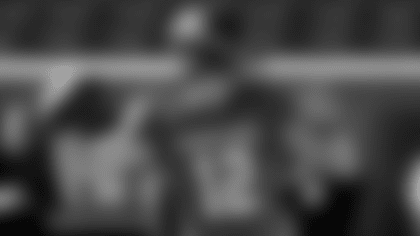The NFL Rulebook is a constantly-evolving document. Every offseason brings some revisions; last year, the biggest change was shortening the overtime period from 15 minutes to 10. In 2016, centralized oversight from the league office was added to replay reviews; in 2015, the extra point line of scrimmage was moved back to the 15.
And so on. There will be some changes this year, too, and some of them will be decided upon as soon as the next 72 hours. Team owners and head coaches, as well as the league's Competition Committee, have gathered in Orlando for the Annual League Meeting, and one item on the agenda is to consider 10 proposed changes to the rulebook. The topics range from flagrant fouls to overtime turnovers to pass-interference enforcement, but undoubtedly the most anticipated conversation regards defining, once again, what a catch is.
There are also a dozen proposed changes to the league's bylaws, which are mostly pretty dry unless you're the team employee in charge of entering personnel transactions, and four resolution proposals. Those latter proposals are of some interest – particularly the one that would allow teams to sign head coaches from other teams' staffs before that latter team's postseason run is over – but for now let's concentrate on the 10 rule changes to be discussed.
Do these proposed changes make sense? Will they produce the desired results? Do we like them? Let's take them one by one, in the order they are presented in the league's press release on the subject.
1. By Competition Committee: Makes permanent the playing rule that changes the spot of the next snap after a touchback resulting from a free kick to the 25-yard line.
The NFL has already been playing under this rule since 2016 and obviously likes the results if it wants to make it permanent.
(Permanent" here doesn't really mean permanent, as the league could always adopt a new rule some years in the future moving it back to the 20-yard line. For instance, the NFL moved the kickoff line of scrimmage from the 35 back to the 30 in 1994 to account for stronger-legged kickers and a rise in touchbacks, then reversed course in 2011 when it wanted to increase touchbacks.
The point in 2011 was to increase player safety because studies have shown the kickoff to be the most dangerous play in football, resulting in the most injuries – including concussions – due to multiple players running at full speed and then crashing into each other. That's the exact same impetus for this rule; by moving the touchback start line up to the offense's 25-yard line, instead of the 20, teams would hypothetically urge their return men to settle for touchbacks more frequently.
Has it worked? To some extent, but not nearly as much as the aforementioned change of the kickoff line in 2011. In 2010, 80.1% of all kickoffs were returned, league-wide; the next year, that number dropped dramatically to 53.46%. That mark held steady around 50% for the next three seasons, but then strangely dropped to 41.1% in 2015, the year before the new touchback rule was introduced.
As such, the change in 2016 wasn't that dramatic with the new rule, as the percentage of kickoffs returned only dropped to 39.3%, and it then rose a bit again last year to 40.6%. Some of this is likely due to the touchback rule causing some teams to make strategic decisions in direct opposition of what the rule was supposed to accomplish. That is, some teams believed they could drop a "mortar kick" inside the opponents' five-yard line, but not in the end zone where a touchback was possible, and then stop the return man before he got to the 25.
As such, adopting this rule as "permanent" probably won't have a big effect on game play in 2018, unless more teams decide to try mortar kicks. However, what we may be looking at here is the gradual approach to a more dramatic change: Eliminating kickoffs altogether. That is really the only way to do away with the danger of the play, as even a successful touchback doesn't necessarily eliminate the possibility for injury. In many cases, cover men and blockers are crashing into each other, wholly unnecessarily, before a touchback is executed.
Eliminating kickoffs raises the issue of what to use as a substitute for the onside kick in times of desperation, but the NFL has plenty of bright minds to work on that subject. In the long run, it's probably the right move.
2. By Competition Committee: Changes standard for a catch.
The issue here, ultimately, is going to be more about execution than language. While the rule proposal here doesn't explain what the new catch standard would be, but Vice President of Officiating Al Riveron recently spelled it out on Twitter.
That doesn't sound like an enormous change in the procedure, but further clarification from Riveron indicated that the infamous Dez Bryant and Jesse James plays would not have been overturned if this new standard was in play. That would seem to indicate that the part of the ruling that seems to infuriate fans the most – that possession must always be maintained through contact with the ground if the player is deemed to be falling while making the catch – is going to be addressed.
In both the Bryant and James instances, the pass-catcher seemed to have control of the ball before diving for the goal line. That move ended up costing them, under the previous catch standard, because the dive was interpreted as part of the catch process. Now, perhaps, that same move will satisfy the third bit of criteria noted by Riveron above.
Even more welcome would be a greater emphasis on needing indisputable evidence to overturn a catch. That standard seemed to be applied in the 2017 playoffs, including several notable plays in the Super Bowl, and in both cases it resulted in a play that looked like a catch at full speed remaining a catch after slow-motion replay.
I've argued since the Dez Bryant play that the ruling, while on one hand irritating because it looked like a catch, was properly done by the catch standard of the time. However, the James play finally pushed me over into the other camp. Personally, I welcome this change if it results in what seem like more common-sense rulings.
3. By Competition Committee: Makes the penalties for Illegal Batting & Kicking the same.
Sure, why not? Seems like the same infraction whether you use your hands or your feet. It's hard to imagine some diehard traditionalist pounding the table against this rule in the meetings.
**4. By Los Angeles Chargers: Amends Rule 15, Section 2, Article 5 to add fouls for roughing the passer and fouls against players in a defenseless posture as reviewable plays in the instant replay system.
**
5. By Washington: Amends Rule 15, Section 2, Article 5 to add review of personal fouls as reviewable plays in the instant replay system.
For the most part, the NFL has wanted to restrict replay review to more objective subjects such as catches (okay, maybe a bad example!) and whether a player has crossed the goal line. Other than determining if a team had 12 men on the field, which is about as objective as it comes, replay didn't get involved in the subjective matter of whether a cornerback interfered with a receiver or whether an offensive linemen held a defensive linemen.
New England's Bill Belichick has been asking for at least five years why all aspects of all plays are not reviewable, including penalties. Theoretically, this shouldn't slow the game down because each coach would still only have two (and if both are successful, a third) challenges to spend. It's an intriguing idea and this proposals by the Chargers and Redskins would move the needle a bit in that direction.
Actually, the L.A. proposal would seem to be a subset of Washington's broader idea, which would allow for review of all personal fouls. Sign me up. One of the most frustrating things to witness in an NFL game is when an offense is given a get-out-of-jail-free card by a roughing-the-passer call on a play that replay shows to be far less severe than what the official thought he saw.
Presumably, this rule would allow for a non-call to be changed into a penalty, and if replay shows it to be a legitimate infraction, that's fine. However, in my opinion the greater gain from this rule would be the overturning of spurious calls.
6. By New York Jets: Amends Rule 8, Section 5, Articles 1-4 to change the enforcement for defensive pass interference.
The Jets want the NFL to take a cue from college football and make P.I. calls a 15-yard penalty rather than a spot foul. If you polled league staffs on this one, you'd probably find a pretty even split between offensive and defensive coaches. There are, indeed, two sides to the coin here.
On one side, it can be frustrating to a defense when a judgment call on a play that usually involves some kind of contact results in a game-changing 40-yard penalty. On the other side, reducing the penalty to 15 yards could (and probably would) prompt NFL defensive backs to purposely interfere if they are beaten on deep passes. Might as well take a 15-yard penalty rather than giving up a 50-yard completion, after all.
The Jets' rule proposal does address that concern by suggesting that "egregious" pass-interference infractions would still carry spot-of-foul penalties. Unfortunately, that's just dropping another layer of subjective review on game officials. I suspect that would become just as controversial as some current P.I. calls are.
Early indications are that this proposal does not have much support, and that's probably for the best.
7. By Competition Committee: Authorizes the designated member of the Officiating department to instruct on-field game officials to disqualify a player for a flagrant nonfootball act when a foul for that act is called on the field.
The play you will see highlighted when this rule is discussed is Rob Gronkowski's late hit on Buffalo's Tre'Davious White last year, but this could have affected the Buccaneers, too, if it had been in effect in 2017.
The Patriots tight end got a penalty for throwing himself on top of a prone White after the play, but he was not ejected from the game. There was a similar occurrence when the Bucs visited New Orleans and wide receiver Mike Evans hit cornerback Marshon Lattimore on the sideline. Evans, too, was penalized but not ejected.
Both Gronkowski and Evans did later receive one-game suspensions from the league. If this proposal passes, the centralized review of such plays could happen immediately, rather than in the week that follows, and the offending player could be ejected from the game in which he commits the foul. Assuming the decisions from the centralized officiating department are met with more agreement than last year's catch/no-catch rulings, this is a pretty common-sense proposal.
8. By Competition Committee: Conforms the amount of time in which a team must challenge a play if there is a television commercial break following the play in question.
This is a time-saving proposal, meant to shave a few minutes off a game. Assuming it works, that's another no-brainer.
9. By Competition Committee: Eliminates the requirement that a team who scores a winning touchdown at the end of regulation of a game to kick the extra point or go for two-point conversion.
Speaking of common sense, nobody really needed to see 11 random Saints players trudge back onto the field for a meaningless extra point by the Vikings after Stefon Diggs' unforgettable game-winning touchdown reception. This would eliminate that unnecessary sideshow.
**10. By Competition Committee: If there is a turnover, a team may win an overtime game, even though it scores on its second possession.
**
The convoluted language of this one is hard to parse, and it really covers a narrowly specific occurrence. I'll explain via example that many Buc fans will remember.
In the infamous 2003 Monday Night Football game against Indianapolis, in which Peyton Manning engineered a 21-point comeback in the game's final five minutes, Bucs wide receiver Keenan McCardell scored three touchdowns. Two were traditional catches but the third was actually a defensive score. On the play, Colts safety Mike Doss intercepted an overthrown pass but, as he attempted a return, was hit and forced to fumble by center John Wade. The ball took one hop and flew right into the hands of McCardell, who caught it on the run and sprinted 57 yards untouched for the score.
That is the kind of play the NFL is addressing here. Under the current overtime rules, the game continues if the team with the first possession scores a field goal. The other team gets one possession to try to match that and keep the game moving or win on a touchdown. They have to score on that possession, so any turnover ends the game.
The McCardell play I described above includes three possessions. The Bucs possess it, then the Colts possess it, then the Bucs possess it again. If McCardell had been tackled before the goal line, the Bucs would have technically started a new drive at that point. Thus, if the same thing were to happen in an overtime game, McCardell's touchdown would be on the second possession. And under the current overtime rules, that would be too late. The game would have ended instantly when Doss intercepted the original pass.
Under the proposed rule change, if a play unfolds as described above, with the offense scoring after a pair of turnovers on the same play, the touchdown would count and that team would win. It's hard to imagine why anyone would vote against this proposal, which really amounts to somebody at the league being proactive with their thinking and accounting for an unlikely but possible scenario.
And if it passes, every coach in the league is going to make sure his defensive players know to immediately get down if they intercept a pass or recover a fumble in overtime.






















